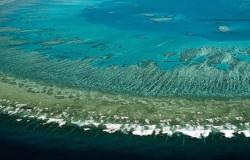Australia, Climate Change and the Great Barrier Reef

David Ritter explores the World’s confusion over Australia’s lack of action over the deteriorating state of the Great Barrier Reef.
There are aspects of every liberal democracy that seem incomprehensible from outside. Think the rise of Donald Trump or the debate over gun ownership in the US, or Brexit in the UK. My own country of Australia at present probably has more than its fair share of mystifying attributes. I have lost track of the number of times I have been asked by friends or acquaintances from other nations as to ‘how can Australia – a country so fortunate and wealthy - treat people seeking asylum so badly / fail to meet overseas aid obligations / treat Indigenous people so badly / have such a poor record on global warming’… and so on.
Perhaps the greatest source of current perplexity, though, has been the Australian government’s perverse response to the fate of our Great Barrier Reef. People from all over the world know the Reef – they have either been to visit the marvellous corals in person, or they have seen one of the magnificent documentaries. The Reef is, after all, one of the wonders of the world, the largest living structure on the planet and UNESCO world heritage listed.
Over the 2015-16 southern hemisphere summer, it was global news when the Reef was impacted by the greatest coral bleaching event in human history. Much of coral’s colour comes from marine algae known as zooxanthellae which symbiotically inhabit the polyps and provide much of the nutrition that corals rely on to thrive. When surface ocean temperature increases, the coral polyps react to the changing conditions by expelling the zooxanthellae, which in turn leads to bleaching. In severe and protracted bleaching events, the coral will die as a consequence.
The impact of last summer’s great bleaching was staggering with around 93% of the Reef being negatively affected. In June of this year authorities announced that 22% per cent of the Reef’s coral had died as a result.
Scientists were also able to establish a clear link between the great bleaching, climate change and Australia’s massive coal industry. Climate change is the single greatest threat to the Great Barrier Reef and the burning of coal is the biggest fossil fuel driver of climate change. The recent catastrophic mass bleaching of the reef was made 175 times likelier by human-caused climate change, according to a study from the University of Melbourne. As eminent coral reef scientist Terry Hughes had said before the great bleaching occurred:
"The [Australian] government wants to have coal mines operating in 60 years’ time, and still hopes to have a healthy reef. The science says otherwise: either we plan to adequately protect the reef and transition away from fossil fuels, or we abandon the reef and develop the world’s largest thermal coal mines. We can’t possibly do both."
Notably, the great bleaching took place less than twelve months since the Australian Government’s desperate bid to prevent the Great Barrier Reef from being given an ‘in danger’ listing at the UNESCO World Heritage Committee meeting in Bonn in June 2015, despite clear and present threats to the Reef from global warming and coal mining in the state of Queensland. In the result, the outcome of that meeting was that the Australian government was placed on what is effectively an eighteen-month ‘probation’ period.
So, how has Australia been doing while on probation? A few key moments in the period tell a consistent story.
● October 2015: The Australian government grants environmental approval for the giant Carmichael coal mine in Queensland, despite the associated threats to the Reef.
● April 2016: The Queensland state government follows up by providing state level approvals for Carmichael mine.
● May 2016: It is revealed that Australia deliberately prevented all references to Australia being included in a United Nations report on climate change having ‘expressed concerns it could cause confusion and negatively affect tourism.’ No other country is cited in the report as having made any similar request.
● June 2016: As Australia heads towards a national election, both major political parties make funding announcements in relation to the Reef that are regarded by experts as deeply inadequate.
● In September 2016, Australia reports to UNESCO that key proposed legislative changes to protect terrestrial native vegetation – an important measure in the fight to save the Reef – have been failed to pass in the Queensland Parliament.
Given the unhappy record over recent years, it is unsurprising that global figures, from United States President Barack Obama, to Sir David Attenborough, to comedian Ellen DeGeneres and others, have expressed their own mystification and disquiet at the inaction and called on Australia to step up. Within Australia itself, anger, sadness and popular disquiet are palpable and rising, but until fundamental change occurs the sad global head shaking will continue.
David is the Chief Executive Officer of Greenpeace Australia Pacific and a Visiting Fellow to the Faculty of Law at the University of Western Australia. Previously David was one of Australia's leading Indigenous land rights lawyers. He is the author of numerous essays, articles and reviews in law, history, politics and current affairs. His books include The Native Title Market (UWA Press) and Contesting Native Title (Allen & Unwin).
Image Credit: thelockgate via Foter


